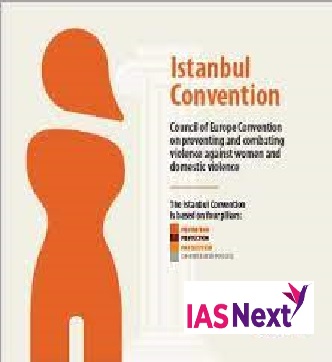CURRENT AFFAIRS
Get the most updated and recent current affair content on Padhaikaro.com
Istanbul Convention on violence against women
- IAS NEXT, Lucknow
- 23, Nov 2021

Every year, men in Turkey murder hundreds of women, and trending hashtags on social media and protests on the street have become sadly familiar.
This month, a particularly brazen killing has triggered a massive outcry over what women’s rights activists say is the government’s failure to prevent gender-based violence.
- Activists say that by withdrawing from Istanbul Convention, a 2011 landmark agreement of the Council of Europe outlining how to ensure the safety of women, Turkey has given up on a roadmap it was the first country to endorse.
Background:
On November 24, 2011, Turkey became the first country to ratify the Istanbul Convention and, on March 8, 2012, it incorporated the Istanbul Convention into domestic law.
Why it’s withdrawal being criticised?
Turkey has received severe criticism from various quarters and has led to protests across the country.
- The country has withdrawn from the convention despite the alarmingly high rates of violence and femicide in the country.
- The country ranks 133 out of 156 countries in the Global Gender Gap report 2021.
- According to UN women data, 38 per cent of women in Turkey face violence from a partner in their lifetime.
- The Turkish government does not maintain any official records on femicides.
What are the reasons for Turkey’s withdrawal?
- It said the convention demeans traditional family structure, promotes divorces and encourages acceptance of LGBTQ in the society.
- Besides, it said, it has enough local laws to protect women’s rights.
Concerns:
- The move comes at a time when domestic violence against women and girls has intensified across the world amidst the Covid-19 pandemic.
- People are also concerned that now even basic rights and protections of the Turkish women will come under threat.
What is the Istanbul Convention?
It is also called as the Council of Europe Convention on preventing and combating violence against women and domestic violence.
The treaty is the world’s first binding instrument to prevent and tackle violence against women.
- It is the most comprehensive legal framework that exists to tackle violence against women and girls, covering domestic violence, rape, sexual assault, female genital mutilation (FGM), so-called honour-based violence, and forced marriage.
When a government ratifies the Convention, they are legally bound to follow it.
- The convention was adopted by the Council of Europe Committee of Ministers on 7 April 2011.
- The Convention sets minimum standards for governments to meet when tackling violence against women.